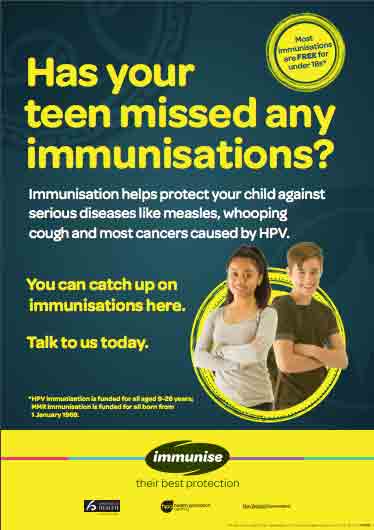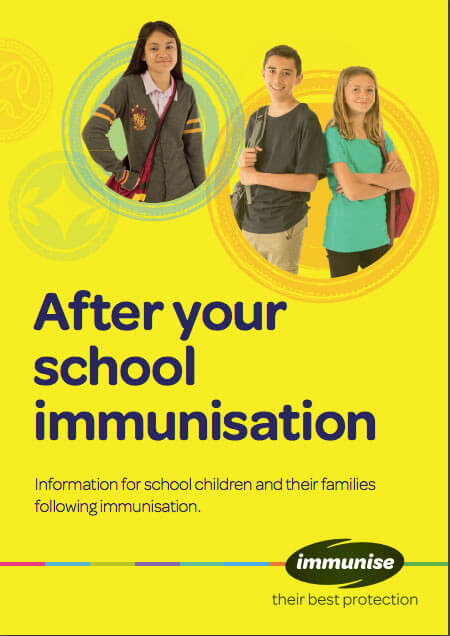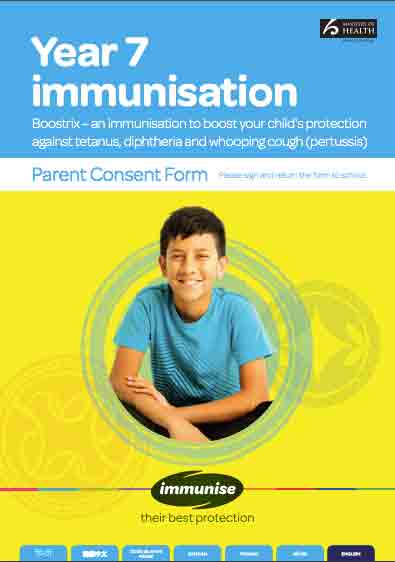If you're a frequent visitor to Healthify, why not share our site with a friend? Don't forget you can also browse Healthify without using your phone data.
Immunisation for older children and teenagers
Immunisation is also known as vaccination
Key points about immunisation for older children and teenagers
- Vaccinations for older children and teenagers include:
- booster doses of vaccines given when they were younger, eg, Boostrix
- catch up doses of any childhood immunisations they might have missed, eg, chickenpox or MMR
- vaccines for some diseases that are more common in teenagers, eg, human papillomavirus (HPV).
- Children and teenagers with weakened immune systems are at a higher risk of certain diseases and health complications. They may need additional vaccines to those mentioned below. If you’re not sure, ask your healthcare provider.

Immunisation involves receiving a vaccine to help your body's immune system protect you against a disease. Read more about how your immune system works.
Vaccinations for older children and teenagers include:
- booster doses of vaccines that were given when they were younger, eg, Boostrix.
- catch up doses of any childhood immunisations they might have missed, eg, chickenpox or MMR.
- vaccines for:
- some diseases that are more common in teenagers, eg, human papillomavirus (HPV)
- meningococcal disease which can spread quickly in shared accommodation environments including halls of residence, boarding school hostels and military barracks
- COVID-19
- influenza that are given every year.
Children and teenagers with weakened immune systems are at higher risk of certain diseases and health complications. They may need additional vaccines, eg, Shingrix®. If you're not sure what they need, ask your healthcare provider.
At about 11 years of age, children are given the Boostrix vaccine as part of the National Immunisation Schedule(external link).
The Boostrix vaccine:
- is a single injection that offers protection against tetanus, diphtheria and whooping cough (pertussis).
- 'boosts' the protection that babies and children received against tetanus, diphtheria and whooping cough (pertussis).
- may be offered by your healthcare provider or through schools. A public health nurse visits some schools and gives children consent forms to bring home for their parents to sign for each vaccine. Parents need to fill out the forms and say whether or not they consent to the vaccine, sign the form and return it to the school.
Read more about tetanus, diphtheria and whooping cough.
The chickenpox vaccine (also called varicella vaccine) is free for children turning 11 years of age who haven’t already had chickenpox or been immunised against it when they were younger.
For children who haven't had chickenpox, it's more likely to result in serious complications if they catch it when they're older.
Read more about the chickenpox vaccine(external link).
Immunisation against COVID-19 is an important way we keep our tamariki safe. It protects them from many serious complications of COVID-19 infection and stops disease spreading within your whānau and the community.
Ages 12 to 15 years
- Young people 12 to 15 years of age are eligible for 2 full adult doses of either the Pfizer vaccine(external link) or the Novavax vaccine(external link) 3 weeks or more apart.
- They're not eligible for a booster.
Ages 16 and 17 years
- Young people 16 to 17 years of age can get 2 adult doses of either the Pfizer or Novavax vaccine (3 weeks apart).
- They can also get a Pfizer booster if it’s been at least 6 months since their last dose.
Read more about the Pfizer COVID-19 vaccine in children.
The human papillomavirus (HPV)(external link) vaccine (also called Gardasil 9) is free for children and young people 9 to 26 years of age.
The HPV vaccine:
- Protects against 9 strains of HPV that can lead to cervical and some other cancers and genital warts.
- Gives long-lasting protection. is offered to all genders, usually at school in Year 7 or 8.
- May be offered through schools or by your doctor (GP). A public health nurse visits some schools and gives children consent forms to bring home for their parents to sign for each vaccine. Parents need to fill out the forms and say whether or not they consent to the vaccine, sign the form and return it to the school.
Tamariki 9 to 14 years of age
The HPV vaccine is given as 2 doses, 6 months apart. People in this age group develop a stronger immune response than those vaccinated when they're older.
Rangatahi 15 years and older
The HPV vaccine is given as 3 doses, spaced over a 6 month period.
Read more about the HPV vaccine(external link).
The influenza vaccine can help stop you getting very sick from flu if you do get it.
It's especially important for tamariki and rangatahi with certain long-term (chronic) health conditions, who are most likely to develop complications from the flu, eg, chest infections. If your child does have a long-term condition, make sure they have their flu immunisation every year before the winter starts.
It can be given to other generally healthy tamariki but it’s not funded.
Read more about influenza vaccine(external link).
The MMR vaccine protects against measles, mumps and rubella – 2 doses are needed for full protection. The vaccine is recommended at 15 months and 4 years of age.
Children and young adults under 18 years of age who've missed doses can catch up for free. It's important to have had 2 doses and it's easy to catch up. Contact your healthcare provider to make a plan on how to catch up on this vaccine.
Read more about the MMR vaccine(external link).
Meningococcal disease(external link) is an infection that causes 2 very serious illnesses – meningitis (an infection of the brain) and/or septicaemia (blood poisoning).
Meningococcal vaccines are free for people 13 to 25 years of age during their first year of living in close–living conditions, eg, a boarding school hostel, university hall of residence, military barracks or prison.
Rangatahi can get vaccinated for free up to 3 months before they move into a close–living situation.
If you’re living with many people in a private house, or planning overseas travel, you can pay to get vaccinated against meningococcal disease,
Read more about the meningococcal vaccine(external link).
It’s okay if you’ve missed a vaccination that happened at school or because you were too busy. Even though getting immunised on time is recommended for the best protection, it’s easy to catch up.
It’s important for all tamariki and rangatahi to have had 2 doses of the measles vaccine.
Catch–up immunisations are free for all children under 18 years old. Contact your healthcare provider to make a plan for how you can catch up on your vaccinations.
Vaccination Helpline(external link)
Freephone 0800 28 29 26, weekdays 8.30am – 5pm. Vaccination advice and support to book appointments via Book my Vaccine(external link), including group bookings. Interpreters are available and you can choose to speak with a Māori or Pacific advisor, a disability advisor, or use NZ Relay.
Immunisation for older children(external link) Immunise Health New Zealand | Te Whatu Ora
Brochures
Has your teen missed any immunisations?(external link) HealthEd, NZ
Year 7 immunisation for tetanus, diphtheria and whooping cough (pertussis) (BOOSTRIX™ Vaccine)(external link) HealthEd, NZ Chinese simplified(external link), Chinese traditional(external link), Cook Islands Māori(external link), English(external link), Hindi(external link), te reo Māori(external link), Samoan(external link), Tongan(external link)
After your school immunisation(external link) HealthEd, NZ English(external link), te reo Māori(external link)
See our page Youth health for healthcare providers
Immunisation Advisory Centre (IMAC)(external link)
Freephone 0800 IMMUNE (0800 466 863), weekdays 8.30am – 4.30pm. A local source of independent, factual information based on international and New Zealand scientific research. Clinical information and training for health professionals.
Brochures

HealthEd, NZ, 2022

HealthEd, NZ, 2022
English, te reo Māori
Credits: Healthify editorial team. Healthify is brought to you by Health Navigator Charitable Trust.
Reviewed by: Stephanie Yee, Pharmacist, Auckland
Last reviewed:
Page last updated:






